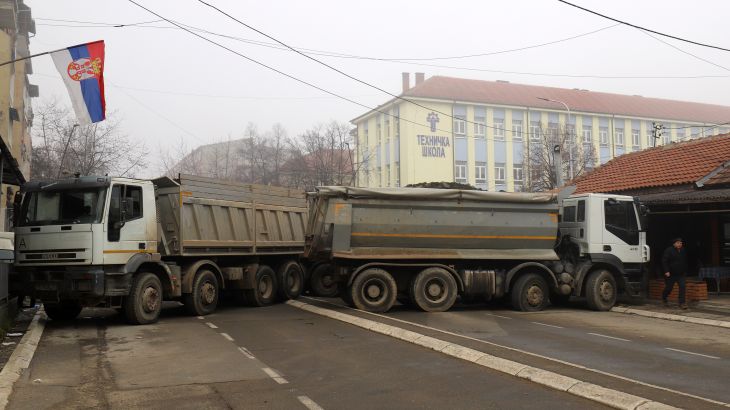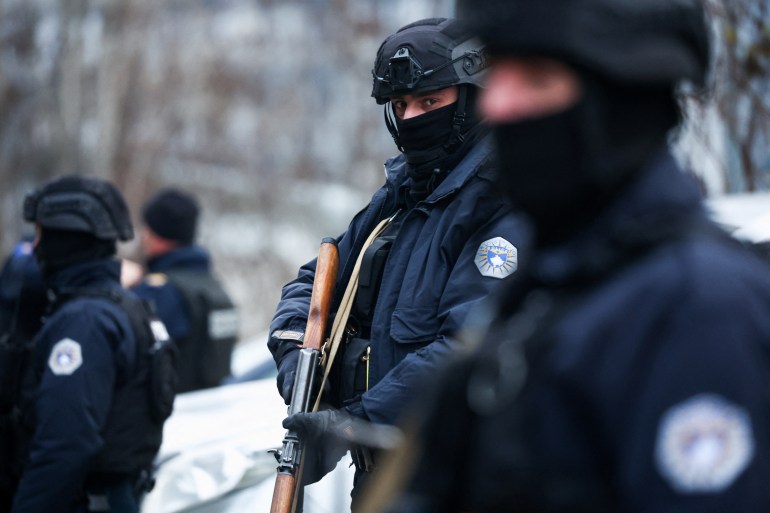Ethnic Serbs erect more roadblocks as tensions soar in Kosovo
Kosovo has demanded barriers erected by Serb protesters be removed while Serbia has put its army on high alert.

Ethnic Serbs have erected more roadblocks in northern Kosovo and defied demands to remove barriers put in place earlier, a day after Serbia put its troops near the border on a high level of combat readiness.
The new barriers, formed of loaded trucks, were installed in the early hours of Tuesday in the town of Mitrovica. The town is divided between Kosovo Serbs and ethnic Albanians, who represent the majority in Kosovo as a whole.
Keep reading
list of 4 itemsTensions in north Kosovo – whose agenda does the flare-up serve?
Kosovo officially applies for EU membership in symbolic act
What is behind the violence between Serbia and Kosovo?
It is the first time since a crisis in the region erupted in early December that Serbs have blocked streets in one of the main towns. Until now, barricades had been set on roads leading to the Kosovo-Serbia border.
“Criminal groups continue to block the freedom of movement by setting up barricades throughout the night in the north of the country. According to official information, two more barricades with heavy vehicles have been set up,” said a police statement, quoted by the Anadolu news agency.
Kosovar authorities also reportedly blocked Serbian Patriarch Porfirije from entering the country from neighbouring Serbia ahead of Orthodox Christmas celebrations on January 7, according to police.
Serbian Patriarch Porfirije said Kosovo “locked the door of his home”, adding: “I pray to God that he unlock the hearts of those who have closed it and that the love of Christmas and of the birth of the Saviour touch the minds and the conscience of all people.”
Tuesday’s developments came after Serbia’s President Aleksandar Vucic on Monday ordered Serbia’s army and police to be put on high alert in response to the latest events in the region.
Vucic claimed Pristina was preparing to “attack” ethnic Serb areas in northern Kosovo and remove by force several of the roadblocks that Serbs started putting up 18 days ago to protest against the arrest of a former Kosovo Serb police officer.

Serbian Prime Minister Ana Brnabic on Tuesday refused to comment on claims that Serbia had sent armed men into Kosovo to man the barricades.
Kosovo’s government has yet to respond to Vucic’s allegations, but has previously accused the Serbian leader of attempting to stir up trouble and trigger incidents that could act as a pretext for an armed intervention in the former Serbian province.
Meanwhile, Pristina has asked NATO-led peacekeepers (the Kosovo Force, or KFOR) stationed in the country to remove the barricades set up by ethnic Serbs and hinted that its own forces would do so if KFOR does not take action.
About 4,000 NATO-led peacekeepers have been stationed in Kosovo since the 1999 war that ended with Belgrade losing control over the territory.
Simmering tensions in the Balkans
The latest furore erupted on December 10, when Serbs erected multiple roadblocks and exchanged fire with police after the arrest of a former Serb police officer for allegedly assaulting serving police officers during a previous protest.
The ethnic Serbs are demanding the release of the arrested officer and have other demands before they will remove the barricades.
It comes after earlier trouble over the issue of car licence plates. Kosovo has for years wanted ethnic Serbs in the north to switch their Serbian car licence plates to ones issued by Pristina, as part of the government’s desire to assert authority over its territory.
Ethnic Serb mayors in northern municipalities, along with local judges and about 600 police officers, resigned last month in protest after Kosovo’s government finally ruled that Serbian-issued licence plates must be replaced with ones issued by Pristina.

Kosovo declared independence from Serbia in 2008 but remains home to a Serb minority in the north, which is backed by Belgrade.
The declaration of independence came 10 years after a war between ethnic Albanian fighters and Serbian forces that killed 13,000 people, mostly ethnic Albanians.
The war ended with a NATO intervention that pushed the Serbian troops out of today’s Kosovo.
Serbia, supported by its allies Russia and China, does not recognise the statehood of its former province but most Western countries do, including the United States.
About 50,000 ethnic Serbs who live there refuse to recognise Pristina’s authority and still consider themselves a part of Serbia.
Belgrade accuses Pristina of trampling on the rights of the minority Serbs.